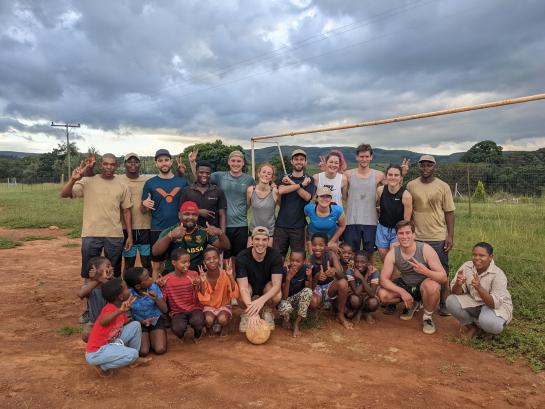
Ten master students in movement and sport sciences and three staff members from the Faculty of Physical Education and Physiotherapy participated in a group mobility project to South Africa. This project received financial support from Global Minds, IRMO and the Internationalization Committee of the Faculty. The group mobility project was initiated by prof. Marc Theeboom, chair of the Sport & Society research group, in collaboration with Sportstec, a non-profit organisation located in Geluksburg, a rural village in the province of KwaZulu Natal. The group mobility project was positioned around Community Engaged Research and Learning (CERL), where academic learning goes hand in hand with societal engagement. The theoretical component of the project was based on understanding the social impact of sport for development initiatives and understanding why, how and in what circumstances such programmes can lead to certain outcomes. This CERL-project abroad was embedded in the curriculum of students at the VUB.
The first semester, prior to the mobility, was used for gaining knowledge about the evolution of the sport for development field across the globe and to increase students’ general knowledge about South Africa. The experiential learning process - including regular reflective practice - took place during the group mobility project in South Africa, more specifically in the urban area of Johannesburg and the rural area of Geluksburg. It was important for the students to better understand the (historical, cultural, and societal) context of the country. During our first days in Johannesburg, students visited Constitution Hill – a former prison complex that currently serves as a museum and is the site of the country’s Constitutional Court. Section Number Four in the prison was reserved for black men and where students of the 1976 Soweto uprising were prisoned. It is a unique site that illustrates the difficult South African journey to democracy and equal rights.
We were able to explore Soweto, the largest township in the country. Students passed by the Hector Pieterson Memorial and the former house of President Nelson Mandela who is known by our students for the quote “Sport has the power to change the world”. The students visited different primary and secondary schools including one school for children with disabilities, talked to principals and teachers, and observed sport and physical activity sessions. During these visits, they saw the challenges that schools, staff and learners are facing, including lack of financial resources, infrastructure, and services. Students also learned about the differences regarding the organisation of physical education and extracurricular sport between South Africa and Belgium.
While in Geluksburg, students worked closely with staff from Sportstec to gain an understanding about their organisational structure, values, programmes, and methodology. As a service to the community, the students organised a sport event for 600 primary school learners. The development and implementation of this sport event was supported by Sportstec, as their cultural knowledge and local network were essential in gaining support from principals and teachers. With very limited infrastructure and materials, students organised a mass participation event that inspired learners to join and be physically active while focusing on the shared value of ‘build your team’. A value that is reinforced by teachers on the field as well as in class.
The final days of the mobility project were spent in the Nambiti Reserve, where the journey was concluded with a safari. There was time to reflect on students’ experiences, and their hopes and fears for the mobility project. Sportstec staff had one last surprise as they gave each VUB student and staff member a personal Zulu name that through its meaning reflects elements of their personality.
The video below shows a recap (5min) of the group mobility project and the experiences of the students.
